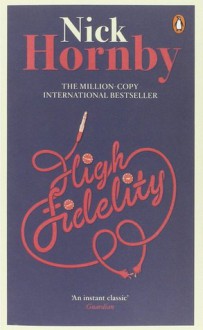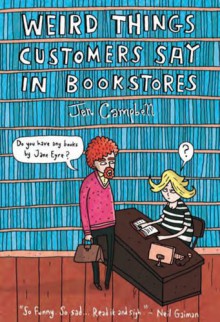
So far, "HIGH FIDELITY" is one of the most entertaining, laugh out loud funny, and insightful novels I've read this year. Though it must be admitted that the main character, Rob Fleming - a quirky and rather self-centered man in his mid-30s, who is the owner of a record shop in the heart of 1990s London - can come across as whiny and egotistical. Yet, he is not without his endearing qualities.
The reader is given entree into Rob's life at a time when his girlfriend Laura (with whom he has shared a flat for a few years) has left him. He is at a loss and begins to reflect on what he regards as his "all-time, top five most memorable split-ups", which began with Alison Ashworth in 1972 when Rob was barely into his teens and culminated with Sarah Kendrew, a relationship that lasted between 1984 and 1986. It was a treat to be given a retrospective tour of Rob's love life with these 5 women. His personal observations I found very revealing, though he could be a bit insufferable. Here are some of his musings that gave me much food for thought:
"... what was the significance of the snog? The truth is that there was no significance; we were just lost in the dark. One part imitation (people I had seen kissing by 1972: James Bond, Simon Templar, Napoleon Solo, Barbara Windsor and Sid James or ..., Omar Sharif and Julie Christie ...) to one part hormonal slavery to one part peer group pressure ... to one part blind panic ... "
"Nobody worries about kids listening to thousands - literally thousands - of songs about broken hearts and rejection and pain and misery and loss. The unhappiest people I know, romantically speaking, are the ones who like pop music the most; and I don't know whether pop music has caused this unhappiness, but I do know that they've been listening to the sad songs longer than they've been living the unhappy lives." - p.19.
Music is the metaphor that infuses and enlivens "High Fidelity." Rob lives and breathes it. Indeed, his music store (with his two employees, mild-mannered, steady, and self-effacing Dick and know-it-all, sardonic Barry) is an extension of himself. There is an instance where, one night after closing shop, Rob, Barry, and Dick go to a pub for a few beers and entertainment. The entertainment comes in the form of Marie LaSalle, an American singer/songwriter whose look reminds Rob of the actress Susan Dey as she was when she starred in the late '80s TV drama "LA Law". He is enthralled with her singing. What I found both funny and poignant was his admission of the effect Marie LaSalle's version of Peter Frampton's 'Baby, I Love Your Way' had on him. Let me cite in full what he had to say about that. (When I was reading this section of the novel on the subway, I had to restrain myself from laughing out loud and uproariously.)
"Imagine standing with Barry, and Dick, in his Lemonheads T-shirt, and listening to a cover version of a Peter Frampton song, and blubbing! Peter Frampton! 'Show Me the Way'! That perm! That stupid bag thing he used to blow into, which made his guitar sound like Donald Duck! Frampton Comes Alive, top of the American rock charts for something like seven hundred and twenty years, and bought, presumably, by every brain-dead, coke-addled airhead in LA! I understand that I was in dire need of symptoms to help me understand that I have been deeply traumatized by recent events, but did they have to be this extreme? Couldn't God have settled for something just mildly awful - an old Diana Ross hit, say, or an Elton John original?
"And it doesn't stop there. As a result of Marie LaSalle's cover version of 'Baby, I Love Your Way' ('I know I'm not supposed to like that song, but I do,' she says with a cheeky smile when she's finished), I find myself in two apparently contradictory states: a) I suddenly miss Laura with a passion that has been entirely absent for the last four days, and b) I fall in love with Marie LaSalle."
There's more - more entertaining, funny, and observational "bits" (as the British would say) - to "High Fidelity", which I leave to the readers of this review to discover for themselves. I invite all of you who are uninitiated to Nick Hornby's writing style and to "High Fidelity", in particular, to buy or borrow this novel. You'll be in for a fun and rewarding journey.


 Log in with Facebook
Log in with Facebook 







